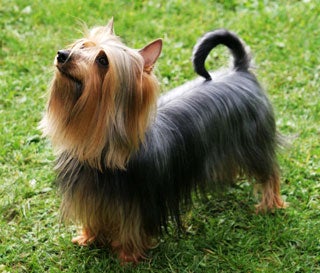Learn about dog breeds
Detailed information & photos on over 190 different breeds
Description
Also known as the Sydney Silky and Australian Silky Terrier, the Silky Terrier is an energetic, lively, entertaining, confident companion dog. These charming little dogs are family dog that looks very much like Yorkshire terriers. Although not the right choice for many people, these curious, little Silky terriers can be temperamental and require owners that have the time to devote a lot of attention on their little terrier.
The lightly built, compact Silky terriers are moderately low-set and fine boned with a wide, flat head and v-shaped ears. Its eyes are dark, round, and piercing with a dark nose, sturdy jaw, and scissor bite teeth. These tiny terriers weigh from eight to eleven pounds and stand nine to ten inches high. It is definitely an indoor dog so the Silky is perfect for anyone that spends a lot of time inside. This tiny dog is energetic, confident, dependable and loyal making it a wonderful companion, watchdog, and friend.
Coat Description
The Silky Terriers magnificent fine, flat, single coat is sleek, glossy, and five to six inches long, parting down the back but not reaching the floor. The topknot, which keeps the hair out of the Silky Terriers eyes, is normally lighter colored than the dogs tan points. Although all Silky Terrier puppies are born black, the adult dogs are blue with tan markings or fire red and blue.
History
The Silky terriers exact origin is unknown but some believe that the breed developed from crossing other dog breeds such as the Cairn, Skye, Yorkshire, and Australian terriers in the nineteenth century. This story is likely incomplete because in the late 1800’s, the Silky Terrier is believed to have emerged before the Australian terrier was fully developed. In 1959, the American Kennel Club recognized the Silky Terrier as a breed. In 1962, its standard was established and updated in 1967. A wonderful companion dog, Silky Terriers are still adept at killing rodents and snakes.
Temperament
Not a laid-back lap dog, the loving Silky terrier is an alert, courageous, extremely intelligent, sociable, affectionate little dog that makes an excellent companion that wants to be near its master. Curious and full of energy, the Silky terrier can also be a bit willful. He has the temperament of a true terrier so likes chasing, barking, and digging. A loyal family dog, he requires human companionship so is not suited for a home where he is alone a great deal of the time. The Silky loves being indoors, involved in his family’s daily life, following them around, curled up on a comfortable lap, or ready to play. An adaptable small dog, he is ready to go for a walk, play or travel any time.
Self-assured, friendly and spirited, these confident little terriers are independent but can be possessive of their territory. Intelligent, strong-willed dogs that learn quickly, they require early socialization and training to keep them well behaved, confident, non aggressive and from becoming intolerant of strangers. Silky terriers get along well with children, especially when raised together. Because of their tiny size, children need to understand these little dogs and know how to treat and handle them. Although not a dog to be trusted around smaller pets, they make great friends to other family dogs.
Health Problems
Generally a healthy breed of dog, Silky terriers, like all breeds, sometimes have certain health problems including:
[-]Epilepsy [/-]
[-]Intervertebral Disc Disease[/-]
[-]Genetic Eye Disease[/-]
[-]Diabetes Mellitus[/-]
[-]Legg-Calve-Perthes Disease[/-]
[-]Elbow Dysplasia[/-]
Although not all Silky terriers will get these diseases, it is important to know what to watch for.
Grooming
The low to non-shedding little Silky terrier is high maintenance and requires approximately fifteen to thirty minutes of brushing and combing daily to keep its lustrous coat in top condition, as they are prone to mats and tangles.
A monthly bath will keep the Silky Terriers hair tangle free, silky clean and looking its best. Always use a good quality dog shampoo and conditioner in order to avoid matting, tangles, or split ends. Thoroughly dry the dog after its bath and keep him warm because Silky Terriers do feel the cold. Occasionally trim the dog’s coat, keeping the hair from the knees down short. Put the hair on top of its head in a topknot to keep it out of the Silky terriers eyes.
Exercise
Silky Terriers are full of energy, have surprising stamina and love going on daily walks or runs, whether it is hiking in the country or a walking around the neighborhood. Because of their hunting background, Silky terriers love chasing small animals, so always keep the dog on a leash when out walking. Along with daily walks, they enjoy romping outside in a fenced yard or a trip to either a small breed dog park or one with a special area for little dogs. On days that the weather is bad or you cannot take your Silky Terrier for a walk, an energetic game of fetch, tug-of-war, or chasing indoors will keep the dog exercised and active.
Training
Silky Terriers are very smart, highly trainable little dogs that should receive socialization and obedience training at a young age. Some terriers are aggressive and territorial when not socialized properly. These small dogs respond best to positive training where their master is patient, loving and uses praise, treats and toys as a reward. Always keep the training sessions short, interesting, and fun so the Silky Terrier does not become bored.
Advertise | Privacy Policy | Terms of Use | Contact Us © Copyright 2004-2024 PupCity.com. All rights reserved.
